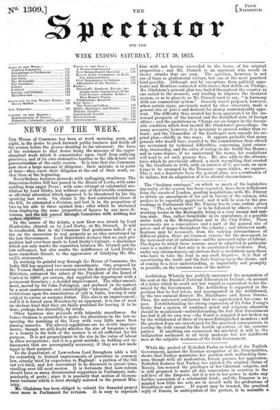NEWS OF THE WEEK.
THE House of Commons has been at work morning, noon, and night, in the desire to push forward public business and finish off the session before the grouse-shooting be far advanced : the force of the resistance to that desire being the measure of the super- abundant work which it concentrates upon itself from outlying provinces, and, of its own obstructive laxities in the idle debate and procrastination of the early session. It is true that the Commons now show a large amount of diligence : their mistake is in point of time—they exert their diligence at the end of their work, ra- ther than at the beginning.
Nevertheless, business proceeds with unflagging steadiness. The Suocession-duties Bill has passed in the House of Lords, with some scolding from angry Peers ; with some attempt at substantial mu- tilation by Lord Derby, but without any of that terrible resistance or effectual alteration which appeared to be threatened by his big speaking last week. On clause 2, the first substantial clause of the bill he attempted a division, and lost it in the proportion of two on his side to three against him ; after which he abstained from displaying the same proportion of figures by any more di- visions, an the hill passed through Committee with nothing but spoken
In the course of the debate, a new blow was struck by Lord Ilardwicke; altered on by Lord Derby, at Mr. Disraeli. It will be recollected,- that in the Commons ihat gentleman talked of a tax on the succession to real property as an idea entertained by the lath Government. Lord Hardwicke declares that no such pro- position had ever been made to Lord Derby's Cabinet ; a disclaimer which not only marks the separation between Mr. Disraeli and his late colleagues, but also marks the indifference of Lord Derby's more immediate friends to the appearance of falsifying Mr. Dis- raeli's statements
In working its painful way through the House of Commons, the India Bill has acquired two more amendments. One, proposed by Mr. Vernon Smith, and overcoming even the desire of resistance in Ministers, enhanced the salary of the President of the Board of Control to 50,001. per annum, and supplied the department with a permanent Secretary ; a decided improvement. The other amend- ment, moved by Sir John Pakington, and prefaced in its context by a most cumbersome and unintelligible "whereas," abolishes all restrictions upon the manufacture of salt in India, leaving it only subject to excise or customs duties. This also is an improvement; and if it is forced upon Ministers by an opponent, it is one of such an obvious kind that they are fairly punished for leaving it to be done, perhaps less discreetly, by rivals. ' Other business also proceeds with tolerable smoothness. Sir James Graham is permitted to make his alterations in the law re- specting the manning of the Navy with very little more than passing remarks. The altered regulations are no doubt improve- ments; though we still doubt whether the rise of twopence a day as a bounty to the bulk of the seamen is at all sufficient for the purpose. It is not proportionate to the rise in the value of labour in other occupations ; and it is a great mistake in holding out in- ducements that are peremptorily necessary, if they are not made equal to their purpose.
To the department of Law-reform Lord Brougham adds a bill for extending to Ireland improvements of procedure in common law, already, tried by experience in England : a portion of the bill not yet tried, and not convenient to be discussed in circuit time, standing over till next session. It is fortunate that Law-reform should have so many disinterested supporters in Parliament, inde- pendently of party ; since it is precisely that section of Govern- ment business which is least strongly manned in the present Min- istry. Mr. Gladstone has been obliged to submit his financial project once wore to Parliament for revision. It is easy to reproach
him* with not having succeeded in the terms of his original proposition ; and Mr. Disraeli is an opponent who revels in showy attacks that are easy. The question, however, is not one of fame or gladiatorial victory, but one of the most practical kind possible. Although met by exceptions from political oppo- nents and Members connected with classes that dabble on 'Change, Mr:Gladstone's general plan was hailed throughout the country as one suited to the moment, and tending to improve the financial system, so as to place it, as Mr. Disraeli used to say, "in harmony with our commercial system." Scarcely was it proposed, however, when certain signs, previously noted by close observers, made a general rise of'prima, and demand for money unmistakeably appa- rent. The difficulty thus created has been aggravated by the un- toward prospects of the harvest and the disturbed state of foreign affairs ; and the quotations on 'Change are no longer in the favour- able condition which first invited Mr. Gladstone's proceedings. On many accounts,: however, it is necessary to proceed rather than re- tract; and the Chancellor of the Exchequer now amends his ori- ginal plan—chiefly in two ways. It appears probable that many persons who would have resorted to the commutation then offered are restrained by technical difficulties, concerning joint owner- ship, trusteeship, and the rules of voting in the South Sea Rouse; and in some degree, if we understand the terms, his resolutions will tend to set such persons free. He also adds to the alterna- tives which he previously offered, a stock resembling that created by Mr. Goulburn in 1844, with an interest of 31 per cent, on open terms to be arranged by the Treasury—upon tender, we suppose. This is not a departure from the general plan, nor a confession of its failure, but an adaptation of it to altered circumstances.


























